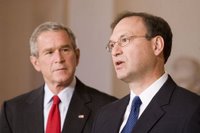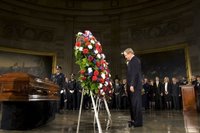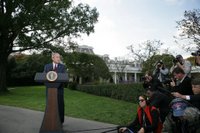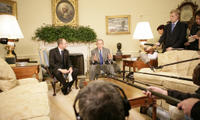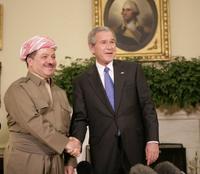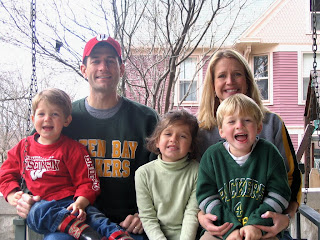President Outlines Economic Growth Agenda , FULL STREAMING VIDEO, J.W. Marriott Hotel, Washington, D.C. 1:02 P.M. EDT
THE PRESIDENT: Thank you, all. It's about time you invited a President. (Laughter.) Thanks for having me. As you know, there was an important presidential election last year. There was a lot of debate and the stakes were high. Fortunately, for all of us here it came out the right way -- Vernon Jordan was elected president. (Laughter.) My only regret is Vernon didn't tell me this was lunch. (Laughter.) I was looking for some warm food.
But it's good to be here, thanks for inviting. I appreciate all of you taking a lead in the economic vitality of this city. As a part-time resident, I'm pulling for a good economy and job creation. Most of all, I appreciate the fact that you provide scholarships for graduate students. I think it's a noble cause to do that. It's impressive that you understand that we have a duty to pay back to society. And the idea of providing scholarships for graduate students who want to study economics and business is a good idea, and I hope you keep doing it.
You know, one of the important things about America is that in a capitalist system people who benefit from the system understand there's an obligation to put something back into the system, an obligation to help people in need. And I want to thank you for leading the way.
I appreciate the board of directors having me here, and I appreciate the D.C. government officials who are here.
I'm going to talk a little bit about the economy. My most important duty as regards the economy is to foster an economic environment that encourages entrepreneurship. Government does not create wealth. The role of government is to create an environment in which people can feel comfortable risking capital and realizing dreams. That's how I view my role.
I took a step toward that -- I took an important step last Monday when I nominated a distinguished economist named Ben Bernanke -- perhaps some you know him. He's a decent man. He brings impeccable credentials and sound policy judgment and sound character to this vital post. And he will continue the superb leadership that Alan Greenspan has provided at the Fed. (Applause.)
We have got a resilient and strong economy. If you think about what this economy has been through I think you'll agree with me it's been resilient and strong. In the past five years -- that happens to be the amount of time I've been here -- this economy has been through a stock market bubble. We've been through a recession, we had the attacks of September the 11th, we had corporate scandals, we've had the rising price of energy, and we've had natural disasters. And these were shocks to our system. It required action to make sure America was a good place to risk capital. They forced us to make choices here in Washington. We could have tried to solve problems by raising taxes and dictating solutions from the nation's capital. That's not the route I decided to go.
We gave Americans an opportunity to keep more of what they earn and let them decide the best way to save and spend and invest their money. To get our economy moving again this administration has followed a clear principle: we put our trust in the hard work and good sense of the American people.
And so that's why we cut the taxes. We cut taxes on families by lowering the rates, we cut taxes on the child credit, we reduced the marriage penalty. We cut taxes on dividends and capital gains to encourage investment. We cut taxes on small business owners who often pay their business taxes at the individual income tax rate. We created incentives for small businesses to invest in new equipment, expand and create jobs. And to help our families and our farmers and entrepreneurs pass on the results of a lifetime of hard work to their loved ones, we put the death tax on the road to extinction.
These pro-growth policies have worked. Real disposable personal income has grown by nearly $1,900 per capita. Home ownership has reached an all-time high. More minorities own a home today in America than ever before in our nation's history. Productivity is growing at the fastest rate in nearly 40 years.
Over the past 28 months, America's entrepreneurs have created more than 4.2 million new jobs. The unemployment rate is 5.1 percent. That's lower than the average rate of the 1970s, 1980s, and 1990s. These policies have helped us achieve a growth rate of 3.6 percent over the past year, more than three times that of Europe and nearly twice that of Japan. The unemployment rate is roughly half of the unemployment rates in Germany and France -- I might remind you, countries where workers and businesses face higher taxes, a lot of regulation, and big government. When people in these countries look for a place to invest their savings, by the way, they look right here to the United States of America.
Our economic policies have helped create jobs, growth and opportunity, yet every day brings new and stiff competition for our nation's workers and businesses. In the coming decades, there's going to be a time of great opportunity -- if we make the right decisions, if government doesn't foul it up. So we're moving forward with an agenda to ensure that America is entrepreneurial heaven, the place where people can realize their dreams.
The agenda starts with keeping taxes low and restraining the spending appetite of the federal government. Tax relief left more money in the pockets of the people, and that has been a vital part of the growth of our economy. Yet, tax relief is set to expire in the years ahead. We need certainty in the tax code. We need to say to our risk takers, here's the way the tax code is going to look in the years ahead, therefore I think it's important that we make the tax relief permanent.
As we provide more incentives for people to work and invest, tax relief has led to faster economic growth, which is translated into faster revenue for the federal treasury. This year, thanks to rising revenues and wise fiscal policy, the deficit was $108 billion less than expected. To continue reducing the deficit we need to keep the taxes low, and we've got to redouble our efforts to be wise about how we spend your money.
Earlier this year I submitted the most disciplined proposal for non-security discretionary spending since Ronald Reagan was in the White House. My budget proposed an actual cut in spending on non-security discretionary spending. Congress needs to make that cut real. I'm open to a further across-the-board spending cuts, as well. My budget has proposed vital reforms in mandatory spending that will save the taxpayers $187 billion over the next decade, part of our plan to cut our deficit in half by 2009.
Some have said that the unprecedented destruction caused by the recent hurricanes means that we've got to put our plans to cut the deficit on hold. I disagree. We don't have to do that. We can help the people of the Gulf Coast region recover and rebuild, and we can be good stewards of the taxpayers' dollars at the same time -- which means we're going to have to reduce unnecessary spending elsewhere in the budget. My administration is working with Congress to identify offsets and spending rescissions so we can provide for emergency relief in a fiscally responsible way.
I met with the leader of the House and the Senate today, and we're working on a plan for pushing significant reductions in mandatory and discretionary spending. Both Houses are on progress -- making progress toward cuts that will show the American people we're capable of being wise about the money, and at the same time, meet our priorities. I encourage Congress to push the envelope when it comes to cutting spending.
See, believe it or not, up here in Washington, there's a lot of programs that simply don't deliver results. (Laughter.) And if it doesn't deliver results, we ought to get rid of them. That will help us meet our priorities: winning the war on terror, and helping the people down there in Katrina, making sure our kids get educated.
If we keep taxes low and restrain spending, we also have got some other long-term challenges to the economy. This economy of ours, as I mentioned, has shown resilience because it's flexible and responsive. But there are three broad challenges we've got to confront. First is, we all must be concerned about our growing dependence on foreign sources of energy. Our families and businesses are hurting because of higher gasoline prices. It's like a hidden tax on the American people. Gasoline prices drain the budgets of our families; they run up the cost on the small business owners.
And the damage inflicted by Hurricanes Katrina and Rita push the prices even higher, disrupting oil and natural gas and gasoline production along the Gulf Coast. These natural disasters have highlighted a problem that Congress needs to pay attention to. It's a problem I've been talking about since I first came to Washington: Our energy supplies are not keeping up with consumption, and that's why people's prices are going up.
Now, I appreciate the work of Congress. I signed a good energy bill this summer. The bill makes an unprecedented commitment to energy conservation and efficiency by promoting new technologies and giving consumers incentives to use energy-saving products. And that was an important title, the energy bill, the conservation title. The bill helps America make cleaner and more productive use of our existing energy resources, like coal and oil and natural gas. And for the sake of energy independence, I know that we can build safe and efficient nuclear power plants, and this country needs to get after it. (Applause.)
This bill helps diversify our supply by promoting alternative and renewable energy sources, such as ethanol and biodiesel. And we're making progress in developing the technologies that will be able to use corn or soybeans to be the feedstock for energy. It makes sense, doesn't it? We grow a lot of corn and we grow a lot of soybeans. I hope one day the President is sitting in the Oval Office and somebody walks in and says, hey, the crops are strong this year; it means we're less dependent on foreign sources of energy.
The bill also helps promote needed investment in our energy infrastructure. It's a good piece of legislation. But it's only a first step. Congress needs to take more steps. We've got to allow environmentally responsible oil exploration in the Arctic National Wildlife Refuge if we want to become less dependent on foreign sources of energy. We need to build and expand our refineries. Do you realize we have not built a new refinery since the early 1970s in America? People wonder why the gasoline price goes up -- it's because we don't have enough supply. People are conserving more, and that's good. But we need more supply of gasoline for the sake of our consumers and for the sake of our economy. And so I'm going to work with Congress to pass a bill that makes it easier for current refineries to expand; that encourages the construction of new refineries so that we've got more affordable fuel for the American people.
In the long-term, reducing our dependence on foreign oil requires looking beyond fossil fuels. So we're making investments necessary to move from a hydrocarbon economy to a hydrogen economy. In other words, what I'm telling you is, is that investments in technologies are going to allow us to diversify from the era of oil and gas. In 2003, we launched an aggressive program called the Hydrogen Fuel Initiative. When hydrogen is used in a fuel cell, it can power consumer products from computers to cell phones to cars that emit pure water instead of exhaust fumes. And I appreciate the Congress in dedicating $1.2 billion into hydrogen fuel research.
Here's the dream -- and I think it's going to happen -- that your children -- your grandchildren, for some of you -- (laughter) -- children, for the younger -- will be able to take their driver's test in an automobile powered by hydrogen.
Secondly, we've got to ensure that we have an education system that prepares a new generation of American workers to fill the jobs of the 21st century. And that starts with making sure we get it right at the elementary schools. I want to thank members of Congress for working with on the No Child Left Behind Act. Let me tell you the philosophy behind that. I don't believe you can solve problems unless you measure. If you're running a business, it's hard to solve problems if you don't measure. And so inherent in the No Child Left Behind Act is the following philosophy: One, every child can learn, and we want to know if they are learning. You see, a system that doesn't hold people accountable basically assumes certain children can't learn, and it's okay just to shuffle them through the school. That's unacceptable in America as far as I'm concerned.
The No Child Left Behind Act challenges what I've called the soft bigotry of low expectations by raising standards and raising accountability and says to the school districts, we'll get you money for -- particularly your Title I students -- but you measure; you measure in the early grades to show us whether or not a child can read and write and add and subtract. And if not, do something about it, change. And we're beginning to see results.
On this year's NAEP test, 4th grade reading scores were six points higher than in the year 2000. That's progress. Fourth grade math scores were the highest in the history of the test. Minority students made progress toward achieving -- closing an achievement gap in America, a gap which, by the way, is unacceptable in this country. And there's more work to be done.
I think we ought to extend the same high standards and accountability to our high schools so that when somebody graduates from high school, the diploma means something. Most of the jobs in the 21st century will demand advanced training and technical expertise, as well as retraining over the course of a lifetime. That's why I'm such a strong believer in the community college system.
We've got programs out of the Labor Department that simplifies the job training programs, that diversifies them and that streamlines them from their inadequate bureaucracies. It's unbelievable what -- the strings attached to job training money here in Washington, D.C., so we're trying to eliminate those strings so the money goes to places that are actually providing a result. I've traveled this country and I've been to community colleges all over that are doing a fantastic job by giving the people the skills for the jobs which actually exist. And so we're going to continue pursuing a strong job training program in institutions that work and that are capable, that have got curriculum that are flexible and schools that are affordable, and people that are trained -- being trained for jobs which are actually existing.
And, finally, we've got to make sure more Americans can go to four-year colleges, and so we've provided more assistance in the form of Pell grants. To make sure that the economic environment in this country is conducive to growth, we have got to make sure our work force is educated.
Thirdly, we must have a health care system that puts patients in charge of decisions, that offers greater choice and allows workers to own their own health care. Listen, I understand the rising cost of health care has imposed large costs on your businesses and our families. But we've begun to make changes here in Washington. I was pleased to sign a bill that confronts costs and creates choice by giving Americans the option of health savings accounts. It's a really innovative product that gives you affordable coverage for major illnesses and allows the worker to save money tax-free for routine medical expenses. It puts the consumer in charge of making health care decisions.
Once you have your HSA, by the way, you can roll over money on a tax-free basis year to year, and you can take it with you from job to job. I strongly urge you to look into HSAs if you're running a business here. Many Americans are already benefiting from the security of HSAs. I proposed tax relief for individuals and employers and low-income families to use HSAs, and I hope the Congress responds.
As we make health care more accessible and affordable, we're strengthening the safety net. When I came to office, I pledged to open or expand 1,200 community health centers to serve an additional 6.1 million people in need of health care. So far, we've opened or expanded more than 800 community health centers. These are cost-effective, smart facilities. It helps the poor and the indigent get much needed primary care. The budget for 2006 provides funding to open or expand more than 500 more community health centers.
We also renewed the promise of Medicare. Medicare is a really important program, obviously. It needed to be reformed. If you're going to have a health care system for the elderly, it seemed like to me the health care system ought to be modern. Do you realize, prior to the reforms that the Congress passed and I proudly signed, Medicare would pay $100,000 for a heart surgery, but not a dime for the prescription drugs that would prevent the heart surgery from being needed in the first place? The system was outdated and it didn't make sense.
And so I worked with Congress for the most significant reform since Medicare was established. Inherent in that bill is not only modernizing the medicine that people get, but it also gives seniors choices. I believe if consumers have more choices, it helps to control cost and enhances the quality of a product someone is able to get.
I also believe that we ought to have what's called association health plans, which will allow small businesses to pool across jurisdictional boundaries, to be able to afford insurance at the same discounts that big businesses get. It's a common sense way to help small businesses insure people. The bill got out of the House, it's stuck in the Senate. The Senate, if they are concerned about the cost of health care for our small businesses, it needs to pass association health plans.
And, finally, we're working to expand information technology in the field of medicine. If you've ever looked at the -- the IT part of medicine, you'll be amazed at how backwards it is. It's easier to get information on buying a car than it is on health care items. And that doesn't make any sense. So we've got a goal to computerize medical records that will help make America's health care more transparent and more efficient, which will help patients make rational choices and help doctors save lives.
To reduce the cost of health care, we've got to do something about medical liability. We've got a problem in America. I've been to states where they have trouble finding an OB/GYN because they're getting -- these good docs are getting sued out of business. It just doesn't make any sense to have a medical liability system that's out of control.
When I first came up here -- these former governors will be pleased to hear -- I thought that medical liability was mainly a state issue, until I realized that there's tremendous cost to the -- to federal medicine. And after all, we're paying for Medicaid and Medicare and veterans benefits. And when the docs who are getting reimbursed by the federal government practice defensive medicine, it runs up the cost to the taxpayers. And when the premiums on their -- on their policies go up as a result of these junk lawsuits, it runs up the cost to the taxpayers.
I've come to the conclusion that medical liability is a national issue that requires a national response. I got a good bill out of the House. The Senate needs to pass medical liability reform so medicine is available and affordable for the American citizens.
And speaking about tort reform, as a part of making sure America is competitive in the world and this is a good place to risk capital, we need more tort reform out of the Congress. We took an important step when we passed class-action reform and bankruptcy reform. I signed a bill today that said if you manufacture a legal product, you shouldn't get sued for it. Now the House and the Senate need meaningful asbestos reform and they need to get it to my desk as soon as possible.
We also need to confront the long-term problems confronting our entitlements. If this country wants to stay competitive throughout the 21st century, we have got to do something about Social Security and Medicare. As you know, I brought up the -- (applause.) They told me not to talk about it when I first got up here. (Laughter.) But I've been talking about it ever since I've been running for President and since I've been the President because I believe the job of a President is to confront problems and not pass them on to future Presidents and future Congresses. (Applause.)
And we've got a problem. It starts with the fact that baby boomers like me are getting ready to retire. It just so happens I turn 62 in the year 2008, which is quite convenient. (Laughter and applause.) And there's a lot of me. I'm getting -- (laughter) -- a lot of people like me. (Laughter.) I mean, there are millions and millions of baby boomers relative to the folks that are going to be paying for my retirement and your retirement. The system is going broke. You know, I give a lot of speeches and look out in the audience and see people working hard to pay their payroll taxes, and they're paying payroll taxes into a system that's just not going to be around unless we do something about it.
And so I've made some proposals to the Congress, proposals that work with how fast benefits will go up, proposals that said if you're in the -- a poor American, nothing is going to change for you; if you're a wealthy American, your benefits will grow, but at a slower rate.
We also have a fantastic opportunity as we strengthen and modernize Social Security to allow younger workers, if they so choose, to put a part -- some of their own money in a personal savings account so they can take advantage of the compound rate of interest; a personal savings account they get to call their own, asset-base the government can't take away, an asset base that somebody can pass on to whomever he or she chooses.
Part of our mission has got to be to encourage ownership in America. And one way to spread ownership throughout our society, into neighborhoods where some may not own anything, is to allow them to save some of their own -- their choice -- in a personal savings account as part of Social Security reform. (Applause.) I'm going to continue to talk to the American people on this issue, and insist that Congress do the right thing and work together to save Social Security.
And, finally, we've all got to remember we live in a global economy. This country is home to about 5 percent of the world's population, which means 95 percent of potential customers live abroad. Millions of Americans -- at least their jobs -- depend on exports. And so to keep this economy growing and creating jobs, we've got to continue to open up markets for American products.
When I came to Congress -- when I came to office, I asked Congress to grant trade promotion authority. My administration has put that authority to good use. We've completed free trade agreements with 12 nations on five continents. We've opened a combined market of 124 million consumers for American products. Earlier this year, we completed a free trade agreement with Central American nations that gives our goods and services the same access in Central America that their goods already get here. In other words, we leveled the playing field. My attitude is, is that our producers and farmers and workers can compete with anybody, anytime, anywhere so long as the playing field is level.
To continue to open up new markets for goods and services and farm products, we have got to work for a free and fair global trading system. The United States has taken a leadership role in working toward a successful conclusion to the Doha trade negotiations at the World Trade Organization. A successful Doha round will reduce and then eliminate tariffs and other barriers on farm and industrial goods, will phase out unfair agricultural subsidies, and open up global markets for services and products and leave all nations better off. The Doha negotiations are now at a critical point.
Recently, the United States has come forward with a bold proposal in the critical area of agriculture to re-energize the talks. Now other nations must come forward with similarly ambitious proposals. Together we have an historic opportunity to knock down trade barriers and create economic growth and reduce poverty throughout the world. Presidents from John Kennedy to Ronald Reagan to Bill Clinton have recognized trade is the most certain path to lasting prosperity for people not only here, but around the world. So I'm going to continue to pursue trade agreements on a bilateral, regional and global level, to open up markets and to maintain our position as a strong economy in the world.
It's important that people in Washington not use trade as a political issue. The objective is to have strong support from Republicans and independents and discerning Democrats, like Vernon Jordan. (Laughter.) I've been disappointed with how the trade debates have gone in Washington. In the 1990s, many Democrats supported important trade agreements such as NAFTA. Fewer and fewer Democrats today are willing to stand by that position and support trade bills that are good for American workers. It's time to get politics out of trade policy and focus on what's best for the United States of America. (Applause.)
I appreciate you giving me a chance to come by and visit with you about the economy. We'll keep making the decisions necessary to ensure that the entrepreneurial spirit is strong, that the small business sector can grow, and that people have got a chance to realize their dreams.
We've got a remarkable country when you think about it. I mean, think about a land where a person can come here from anywhere, or grow up in a -- in a neighborhood, maybe, where there's no hope, and they have a dream of starting their own business and creating wealth and raising a family and owning a home. It's possible in this country. It's not only possible; it's likely, if you work hard. That's the greatest thing about our country. It's such an honor to travel the world, and it always strikes me about how bright the American future is for people.
And our job in Washington is to keep it bright, and to keep it hopeful, and keep making decisions that end up encouraging people to work hard and realize their dreams. This economy is strong; it's going to stay strong. And I appreciate you're working to keep it that way.
Thanks for having me. Mr. President, I appreciate the invitation. May God bless you all. (Applause.)
END 1:36 P.M. EDT, For Immediate Release, Office of the Press Secretary, October 26, 2005
more at President Bush and Economic Growth Agenda or Vernon Jordan and taxes or Economics and hydrogen economy or fuel cell and hydrogen or No Child Left Behind and health savings accounts or Medicare and Social Security
